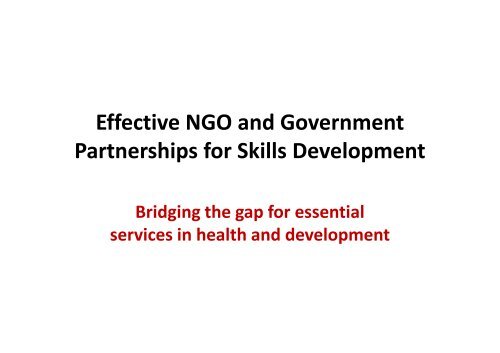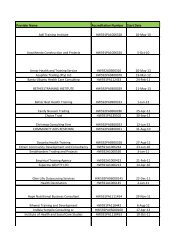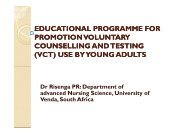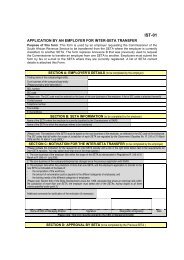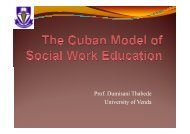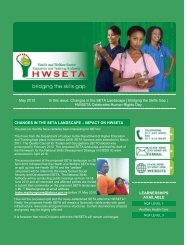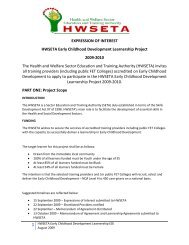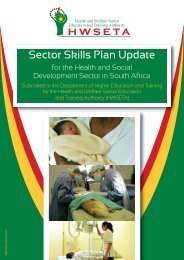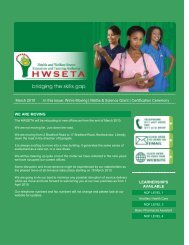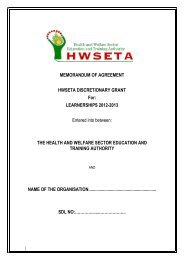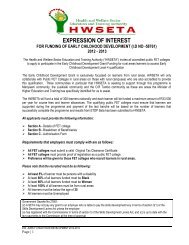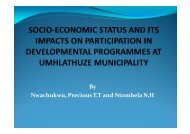Effective NPO and Government Partnerships for Skills Development
Effective NPO and Government Partnerships for Skills Development
Effective NPO and Government Partnerships for Skills Development
Create successful ePaper yourself
Turn your PDF publications into a flip-book with our unique Google optimized e-Paper software.
<strong>Effective</strong> NGO <strong>and</strong> <strong>Government</strong><br />
<strong>Partnerships</strong> <strong>for</strong> <strong>Skills</strong> <strong>Development</strong><br />
Bridging the gap <strong>for</strong> essential<br />
services in health <strong>and</strong> development
Overview<br />
• NGOs: Private Not <strong>for</strong> Profit Organisations<br />
• Case Study of NGO in skills development<br />
• Achieving the MDGs in partnership<br />
• Strengthening Human Resources <strong>for</strong> Health<br />
• <strong>Effective</strong> partnerships <strong>for</strong> implementation<br />
• Capacity building <strong>for</strong> health <strong>and</strong> development<br />
• Conclusion <strong>and</strong> Take Home Message
Role of NGOs as Private Not For Profit Organisations<br />
Non Profit Organisations (Act 71,1997) in<br />
PrimaryHealth Care:<br />
• Health Promotion: Soul City, CANSA<br />
• Food, nutrition, water & sanitation: Mvula Trust<br />
• Family planning, maternal & child care: FHI, RHRU,<br />
ECHO, mothers2mothers, FBOs, CINDI<br />
• Immunisation: Ndlovu Medical Trust, NGOs<br />
• Prevention/control of endemic diseases: HIV, TB<br />
• Promotion of mental, emotional health: Mental<br />
Health Associations, AIDS Consortium, POWA<br />
• Provision of essential drugs: FBOs, TAC, MSF
Case Study:<br />
ECHO: Enhancing Children’s HIV Outcomes<br />
• Established 1997 as Wits Paediatric HIV Clinics to<br />
improve access to holistic HIV care & prevention HIV<br />
infected or affected infants, children & adolescents in<br />
the regions where working<br />
• Affiliation: Wits under Wits Health Consortium:<br />
JH/CMH, CHBH, RMMCH, Mafikeng & clinics<br />
• Services: PMTCT; diagnosis & treatment of HIV<br />
infected children; advocacy <strong>for</strong> prevention <strong>and</strong> ART;<br />
training students, nurses, doctors & health workers;<br />
• Clinical research with international consortiums at<br />
cutting edge treatment, drug regimens, ART access.
ECHO: Enhancing access to ART<br />
• 11,000 children on ART at 3 hospitals, 1/3 world’s children at<br />
Harriet Shezi Clinic, CHBH<br />
• Community outreach: holistic approach <strong>and</strong> quality of lives to<br />
kids on ART – individual & group sessions <strong>for</strong> adolescents,<br />
caregivers, S & RH <strong>and</strong> psychosocial support<br />
Key messages:<br />
• 130 staff, recognising basic counselling not equipping to deal<br />
with HIV/AIDS as 30-50% in the field are HIV positive<br />
• Value adding – retrain/ up-skill staff, teach more skills: art <strong>and</strong><br />
music therapy <strong>and</strong> body mapping<br />
• Staff development – mentoring & supervision more than<br />
didactics; lay counsellors on social auxiliary programmel.
Case Study: <strong>Skills</strong> <strong>Development</strong> <strong>for</strong> service delivery<br />
Case Education Previous<br />
work<br />
GIFT<br />
Married, F<br />
1 child<br />
AUDREY<br />
Married, F<br />
2 children<br />
NKOSANA<br />
29, single M<br />
1 child,<br />
supporting<br />
mother <strong>and</strong><br />
3 siblings<br />
VINCENT<br />
Single M<br />
Grade 11<br />
Grade 12<br />
2008<br />
Office<br />
assistant<br />
Recruited <strong>Skills</strong> development Future goal<br />
2004 Fieldworker, Lay<br />
Counsellor,<br />
Clinical Assistant,<br />
Admin Assistant,<br />
Pharmacy<br />
Assistant<br />
Grade 11<br />
Grade 12<br />
Not working 2005 Volunteer,<br />
Lay Counsellor,<br />
2009 2009 PB Pharmacy<br />
Assistant<br />
Grade 12<br />
Science,<br />
biology,<br />
maths<br />
Cutter ,<br />
upholstry<br />
Radio ad:<br />
DoLabour<br />
ECHO July<br />
2009<br />
Learnership,<br />
Lancet Lab:<br />
Phlebotomy<br />
training 2 yrs & 1<br />
Phlebotomist<br />
Grade 12 Volunteer 2004 Data Capturer,<br />
Data Administrator<br />
Pharmacist<br />
Pharmacist<br />
Medical<br />
Technol. or<br />
Pathologist<br />
Studying<br />
Public<br />
Administrati<br />
on
Strengthening Human Resources <strong>for</strong> Health<br />
NSP 2007-2011: unavailability of skilled personnel<br />
• Defining roles, use, task shifting/sharing: community<br />
health workers, community development workers,<br />
care givers <strong>and</strong> lay counsellors <strong>for</strong> NSP <strong>and</strong> MDGs<br />
Millenium <strong>Development</strong> Goals:<br />
• MDG 4 (reducing by 2/3rds under 5 mortality)<br />
• MDG 5 (reducing maternal mortality by ¾)<br />
• MDG 6 (combat HIV/AIDS, malaria & other endemic<br />
diseases)
HWSETA Sector <strong>Skills</strong> Plan 2005 - 2010<br />
Table 38: Various Learning Areas offered to Companies in the Sector<br />
Source: Analysis of HWSETA WSPs 2007<br />
Learning Area Frequency Percentage<br />
Education <strong>and</strong> Training Initiatives 49 0.98<br />
Apprenticeships 6 0.12<br />
Articles 9 0.18<br />
Internships 22 0.44<br />
Learnerships 281 5.64<br />
Short Courses 3,068 61.57<br />
<strong>Skills</strong> Programmes 1,157 23.22<br />
Work experience 391 7.85<br />
TOTAL 4,983 100
<strong>Effective</strong> NGO & <strong>Government</strong> <strong>Partnerships</strong><br />
• Agreement on essential services <strong>and</strong> rational re-distribution<br />
of tasks in health work<strong>for</strong>ce teams<br />
• Recognise essential health services cannot be provided by<br />
people working on a voluntary basis if they are to be<br />
sustainable<br />
• Volunteers valuable part-time/short term<br />
• Trained health workers who are providing essential health<br />
services, including community health workers, should receive<br />
adequate wages <strong>and</strong>/or other appropriate <strong>and</strong> commensurate<br />
incentives<br />
• Need portable laddered career structures Fig 6: Possible<br />
career structure in the community care/nursing b<strong>and</strong>
SAHR 2008 Strengthening Human Resources <strong>for</strong> Primary Health Care 11<br />
Author: Uta Lehmann<br />
Source: Flow diagram developed by author<br />
Clinical nurse<br />
practitioners<br />
Professional<br />
nurses<br />
Enrolled nurses<br />
Enrolled nursing<br />
auxiliaries<br />
Community health<br />
workers<br />
Community<br />
volunteers<br />
Experience<br />
<strong>and</strong><br />
training<br />
Experience<br />
<strong>and</strong><br />
training<br />
Experience<br />
<strong>and</strong><br />
training<br />
Experience<br />
<strong>and</strong><br />
training<br />
Experience<br />
<strong>and</strong><br />
training
<strong>Effective</strong> NGO & <strong>Government</strong> partnerships<br />
• Fair service level agreements including identification<br />
of essential services in facilities <strong>and</strong> communities<br />
• Contract service bursaries, work experience<br />
learnerships, internships, apprenticeships, in<br />
local/provincial plans, aligning with District IDPs<br />
• Intersectoral collaboration, community involvement<br />
with support, opportunities <strong>for</strong> volunteers<br />
• Forward planning, re-allocation of 1/3 vacant posts,<br />
creation of posts according to need<br />
• Training needs assessments, review of workplace<br />
skills plans <strong>for</strong> health <strong>and</strong> social development by<br />
HWSETA & PSETA
Fig 13
Conclusion<br />
• This is the opportunity to review <strong>and</strong> revise<br />
policies <strong>and</strong> plans in health <strong>and</strong> social sectors<br />
• Skilled personnel are needed in health <strong>and</strong><br />
development with space <strong>for</strong> greater<br />
collaboration <strong>and</strong> sharing of resources<br />
• NGOs <strong>and</strong> civil society play a critical role that<br />
must be recognised <strong>and</strong> supported <strong>for</strong><br />
equitable partnerships with government.
Take Home Message


